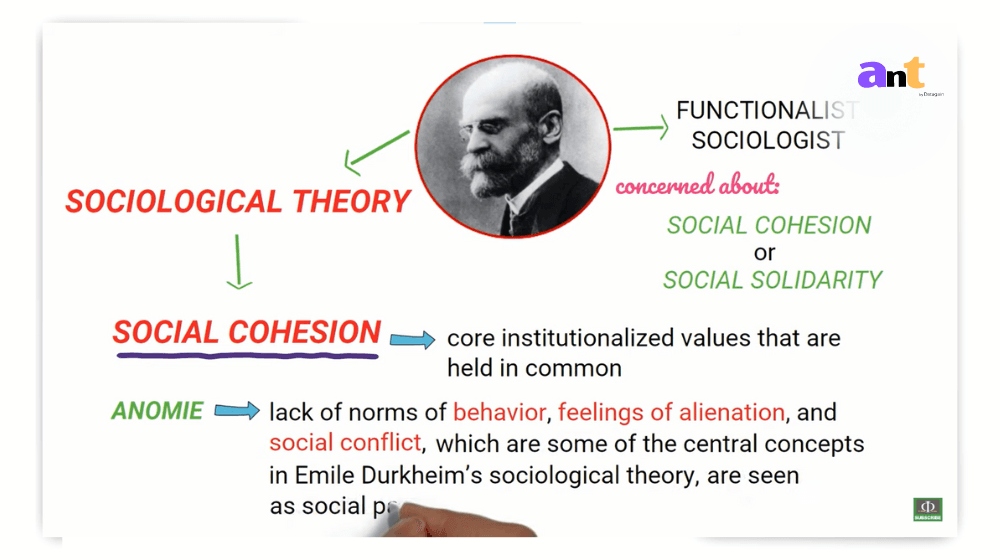
Home » Transcript Library » Sociology » Emile Durkheim’s Sociological Theory: Key Concepts Transcript
Emile Durkheim’s Sociological Theory: Key Concepts Transcript
00:00:07
At the core of Emile Durkheim's sociological theory is the idea of social cohesion. As a functionalist
sociologist, Durkheim is concerned about social cohesion or social solidarity. According to Durkheim,
social cohesion comes from core institutionalized values that are held in common. Thus anomie, that is,
the lack of norms of behavior, feelings of alienation, and social conflict, which are some of the central
concepts in Emile Durkheim's sociological theory, are seen as social pathologies.
00:00:42
Let me briefly discuss the key concepts of Durkheim's sociological theory. I will begin with the concepts of
collective conscience, religion and mechanical solidarity. According to Durkheim, collective conscience
and religion are crucial to social cohesion. This is because first, collective conscience, understood as
beliefs and sentiments that are shared in common by members of a society, creates common condition of
existence. And religion is the main form of collective conscience, which, according to Durkheim, imposes
a uniformity of beliefs and actions. However, it is important to note that Durkheim argues that collective
conscience, expressed in religious beliefs and reinforced by ceremony, which eventually brings people in
solidarity, is true only to small scale societies, for example, tribal societies. Durkheim calls the kind of
solidarity that we can find in small-scale societies "mechanical".
00:01:39
As we may already know, for Durkheim, mechanical solidarity implies the similarity of individuals living in
a society. In other words, in a society held together by mechanical solidarity, members share the same
basic beliefs about the world and about life, which are essentially based on religion, and engage in the
same basic social and economic activities, such as hunting and gathering. These basic beliefs and values
constitute what Durkheim calls "collective conscience". For Durkheim, collective conscience, which is
understood as the totality of beliefs and values, is a determinate system with a life of its own. Because
collective conscience is understood more as norms of society, this system causes the individuals to
cooperate with each other or abide by the laws of the society. But it must be remembered that collective
conscience is not a social structure but is a form of solidarity found in small-scale societies.
00:02:41
Now, as we can see, advanced societies moved away from this type of solidarity, which results in the
weakening of the hold of collective conscience. However, for Durkheim, the paradox of modern societies
is that as they become more individualized so they become more integrated. Thus, Durkheim did not view
modernization as the cause of the disintegration of the old society. As a matter of fact, as already hinted
above, modernization has ushered in a new type of solidarity. And for Durkheim, this is made possible
through the concept of the "division of labor".
00:03:19
On Division of Labor and Organic Solidarity
00:03:23
As already hinted above, the organization of society into tribes corresponds to what Durkheim calls the
segmental structure of mechanical solidarity. Here, a society is made of small groups or segments
organized into tribes with close proximity to one another and where the division of labor is along domestic
lines. As we can see, there is little division of labor in a society held together by mechanical solidarity.
Now, as societies become more advanced, the segments turned into organs with more specialized
functions. Also, advanced societies are now characterized by industrialization and increased division of
labor.
00:04:07
These highly complex and organized societies, therefore, as Durkheim would have us believe, are no
longer held together by mechanical solidarity but by organic solidarity. The collective conscience may
have remained but become less and less important as the type of solidarity that hold these societies
together now comes from occupation rather than kinship, and social interactions are now based on
contracts. With this, Durkheim argues that organic solidarity bases itself on a more specialized form of
social interactions with the individuals linked more to each other rather than to society as a whole.
00:04:46
As we can see, the shift from mechanical solidarity to organic solidarity has led to the idea of system
integration in contradistinction to social integration. In social integration, individuals or groups come
together or integrated into the mainstream society and they are integrated because they share common beliefs and values. In system integration, the society has become more advanced and complex, and the
division of labor has become high organized through the markets, the state, and so on. In system
integration, individuals are integrated through the roles that they played in the society.
00:05:25
Indeed, it is here that the notion of the division of labor comes in. In fact, according to Durkheim, the
division of labor in advanced societies makes individuals more reliant on each other and, in particular, on
the economic functions that different people perform. This is indeed the paradox of the modern society
held together by organic solidarity.
00:05:48
As Ian Craib rightly puts it, the paradox of organic solidarity based on the division of labor is that
members of society become both more individuated and more dependent on society at the same
time; more individuated because in modern societies, people fulfill many different social roles, behave
differently in those roles, and work with different, specialized bodies of knowledge. Beliefs and knowledge
shared by the whole community are no longer sufficient to enable each individual to fulfill his or her task.
We become more dependent on everybody else fulfilling their tasks, vitally dependent. If I were a member
of a hunter-gatherer society, I could go off by myself for long periods of time, looking for food, finding my
own shelter, and so on. In contemporary society, I am dependent on other people – many of whom live on
the other side of the world – to grow my food, make my clothes, supply me with warmth and light, print the
books that I read, service the word processor I write on, and so on. I could have or done none of these
things without society.
00:06:56
On Law, State, and Social Cohesion
00:06:58
Because social bonds become more like contracts in modern societies, law therefore is necessary
according to Durkheim. For Durkheim, law is important for social cohesion because law reproduces the
principal form of social solidarity. Two kinds of law for Durkheim: penal and restitutive. According to
Durkheim, penal law is based on repressive sanctions, which predominates in less advanced societies.
The origin of penal law is religion and it serves to maintain collective sentiments in order to preserve
social cohesion. Thus, as Durkheim argues, punishment's true function is to maintain social cohesion
intact, while maintaining all its vitality in the collective conscience. Restitutive law, on the other hand, is
based on restitutive sanctions, which predominates in modern or more advanced societies. The origin
of restitutive law, according to Durkheim, are contracts, which bind people together in solidarity. And for
Durkheim, the true function of contractual laws is not to inflict harm in order to maintain social cohesion,
but to return things to their normal state and to reestablish what has been disturbed. As we can see,
organic societies are restitutive rather than repressive and aim not so much to punish, but to secure
compensation for damage.
00:08:28
Now, in terms of crises which threaten social cohesion, Durkheim emphasizes the role of the state in
maintaining social cohesion through its regulative powers. Thus, for Durkheim, it is the state that can
ultimately promote and maintain social cohesion, especially in more advanced societies. Durkheim
provided three important reasons why it is the state that can promote and maintain social cohesion in
more advanced societies. First, the state ensures justice and offers protection to the individual. Second,
the state preserves social unity out of diversity, especially of the function brought about by increasing
division of labor. And third, the state, whose primary concern is policy-making, law, and government,
interacts with the rest of society, ensuring that society becomes more consciously directed, as opposed to
being the product of unthinking custom and tradition.
Copyright Disclaimer
Under Title 17 U.S.C. Section 107, allowance is made for “fair use” for purposes such as criticism, comment, news reporting, teaching, scholarship, and research. Fair use is permitted by copyright statute that might otherwise be infringing.






